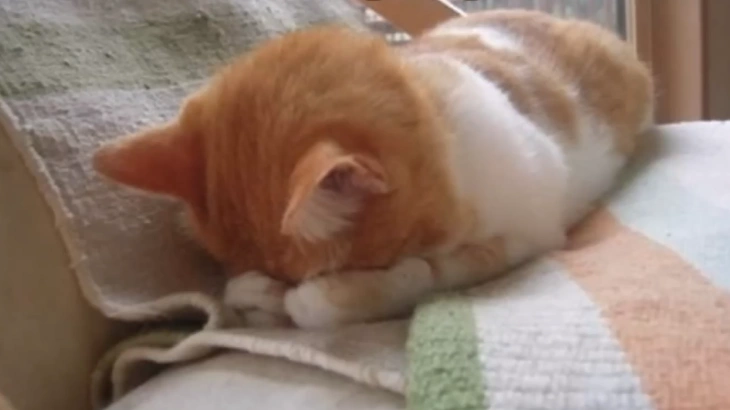7 Sounds Cats Hate That You Should Avoid
By: Elizabeth Rikas

The information in this article is intended to educate cat parents and is not a substitute for veterinary guidance. In case of any concerns about your cat’s health, please talk with your veterinarian.
Cats are creatures with unique personalities and preferences, including what sounds they like and dislike. Understanding the sounds cats hate can help you create a more pleasant environment for your feline friend. This knowledge is essential not only for their comfort but also for building a stronger bond with them.
Also Read: Do Cats Get Jealous?
Types Of Sounds Cats Hate
Firstly, it is important to realize that cats have excellent hearing, which allows them to detect high-frequency sounds that are inaudible to humans. This sensitivity often means that the same noises that might be merely annoying to us can be extremely bothersome to your cat. Here are certain sounds that cats hate the most:
1. Sudden Loud Noises
Thunderstorms, fireworks, and loud music can be incredibly frightening for cats. They often respond with hiding or seeking shelter.
2. Vacuum Cleaners
The loud, continuous noise and vibrations from a vacuum cleaner can upset your cat. Many cats will run to a quiet place when they hear this sound.
3. Crinkling Plastic
Sounds from plastic bags or wrappers can alarm cats. The unexpected noise can startle them, making them feel unsafe.
4. Dogs Barking
If you have a dog, it’s common for your cat to be disturbed by barking. The abrupt, loud nature of barking can make cats jumpy.
5. High-Pitched Sounds
Beeping alarms, electronic devices, or sharp whistles can irritate your feline. Cats tend to prefer lower frequencies.
6. Hissing Sounds
Cats possess an acute sensitivity to hissing sounds, likely due to their instinctive recognition of this vocalization as a threat from other animals. The hiss of escaping steam, a spray bottle, or even another cat can trigger anxiety in your feline friend. Minimize hissing noises around your cat whenever possible, and be mindful of household appliances that may produce similar sounds.
7. Construction Noises
The loud and unpredictable nature of construction noises, such as drilling, hammering, and sawing, can be extremely unsettling for cats. If your home or nearby area is undergoing construction, create a peaceful retreat for your cat where they can escape the noise and feel secure.
Related: Do Cats Like To Be Petted?
Why Do Cats React Strongly To Loud Noises?
The reasons behind a cat’s fear of loud noises can vary. Here are some key factors:
- Sensitive Hearing: Cats have an extraordinary range of hearing, often up to 65,000 Hz. This means that while some sounds may be pleasant and inconsequential to humans, they may be painfully loud for cats.
- Startle Reflex: As a reflex, a sudden loud noise prompts them to react quickly for their safety. This instinctual behavior is crucial for survival in the wild.
- Past Experiences: Cats may develop a fear of specific sounds if they have had a traumatic experience associated with them. This learned behavior can pose a challenge in changing their reactions.
Related: How To Stop Cats From Peeing On Carpet?
How To Help Your Cat Cope With Loud Noises?
While it’s difficult to control the world around your cat, you can take steps to help them feel more secure during loud disturbances. Consider these strategies:
- Create a Safe Space: Designate a quiet area of your home where your cat can retreat during loud events. Add their favorite blanket or bed and any toys that can provide comfort.
- Soundproofing: Use curtains or carpets to help muffle potentially loud noises from outside your home.
- Desensitization: Gradually expose your cat to recorded sounds of loud noises at a low volume, gradually increasing it over time. Pair these sounds with treats to create a positive experience.
- Provide Distractions: Engage your cat with their favorite toys or treats to keep their focus away from the noise.
Interesting Read: Why does my cat sleep between my legs?
Frequently Asked Questions
Final Thoughts
Creating a peaceful home for your feline friend starts with understanding the sounds that make them uneasy. Vacuum cleaners, thunderstorms, even loud music – these everyday noises can cause stress and anxiety. By recognizing these triggers and taking proactive steps like providing a safe haven, using calming techniques, and minimizing exposure to unsettling sounds, you can create a stress-free environment where your cat feels secure and loved. A little understanding goes a long way in building a stronger bond with your furry companion and ensuring your home is a true sanctuary for them.

About the Author
Elizabeth Rikas
Elizabeth is a passionate advocate for feline health and well-being, drawing from her years as a dedicated pet parent to three cats—Gypsy, Swan, and Alfred—and her invaluable experience volunteering at animal shelters. A seasoned writer with a lifelong love for cats, Elizabeth began sharing her insights in her teens and has since contributed extensively to platforms focused on feline care. Through her expertise and heartfelt dedication, she empowers pet owners with practical advice and research-backed knowledge to nurture their furry companions.
